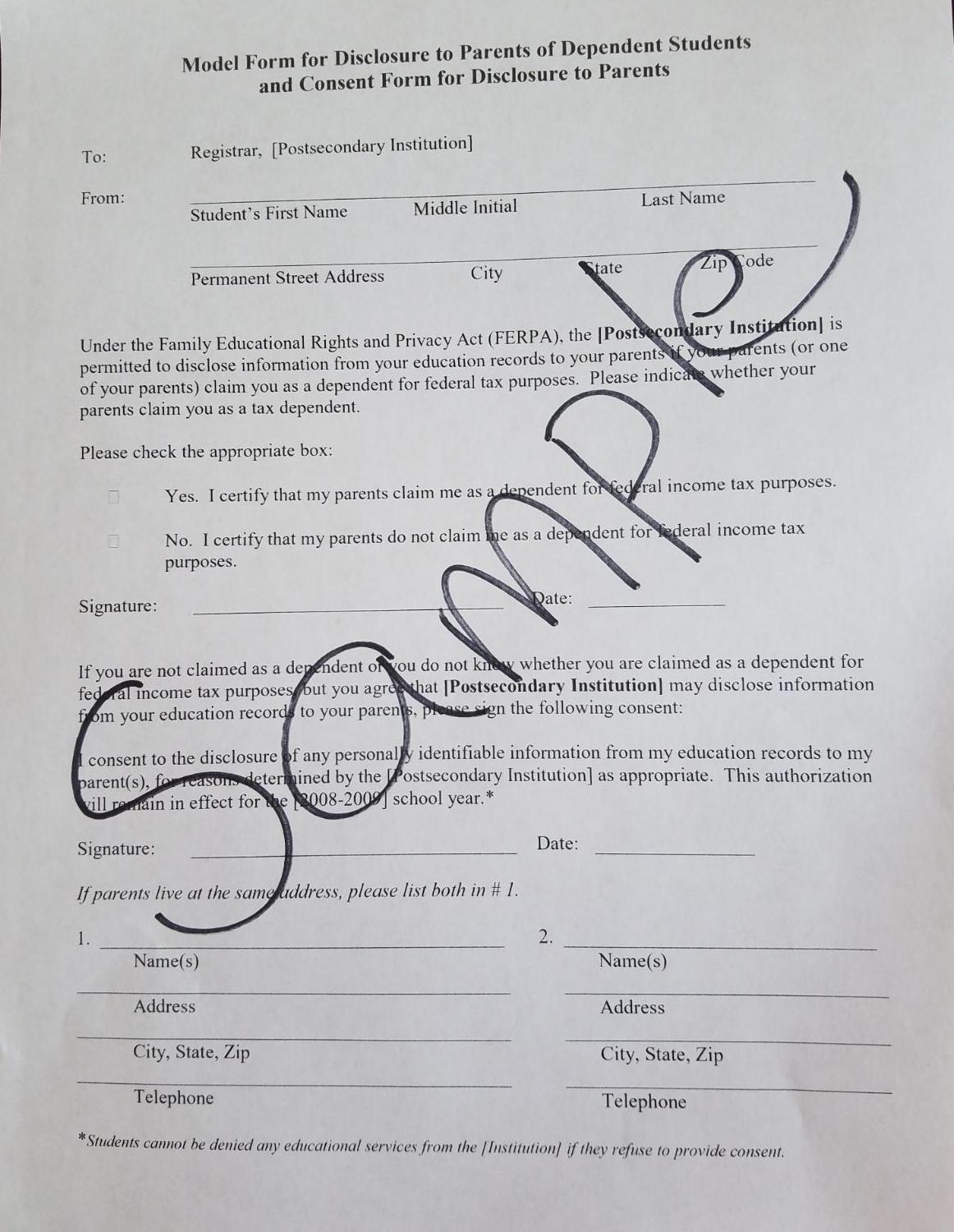The FERPA— or Family Educational Rights and Privacy Act gives parents the right to discuss and review basic educational documents for their student.
When a child is younger, parents are able to discuss any educational records with their child’s teacher. But on that magic birthday—when your child turns 18—parents suddenly become invisible. Citing privacy concerns, the school most likely will refuse to discuss anything academically related to your child without permission.
Enter the FERPA Form
The FERPA is basically an authorization form which gives custodial and non-custodial parent’s the right to access educational records. (An exception to this would be if a parent is forbidden by court; an order to stay away.) At age 18, the student can sign a FERPA form which essentially gives permission to their parents or guardian to view or request the child’s educational records.
These forms are filed independently at each academic institution.
What a FERPA is NOT
It is not a legal form for a parent to step-in to make decisions for their child without any input from that child. Of course, based on your child’s level of disability, administrators and the transition team, can help you get the forms and resources that you need to make informed decisions. Also, with FERPA, schools are still not required to provide access to announcements for school events, calendars, or parent-teacher meetings.
Who Needs a FERPA?
The FERPA is a good tool for parents of students who are cognitively able to understand their transition plan. These students will either go on to college, vocational school, or transition straight to employment after graduation. The FERPA allows parents to be involved with the student as much as he or she needs them to be.
Parents of students who have very limited cognitive functioning, or severe and profound neurological challenges, might want to call the Department of Disabilities to discuss Guardianship services instead. At any rate, once that child turns 18, parents will need to have something in place to help with educational, medical, and lifestyle decisions.
So—what’s the big secret?
The secret is that no one ever mentions that we need a FERPA until we need one! It’s one of the most important documents parents will ever need once their child turns 18. Parents are essentially non-existent without it. We think that because our child is still in high school, then naturally we would have unlimited access to any academic data available on our own child.
Not so!
I recommend students sign the FERPA form just BEFORE they turn 18. Why? Because if not, once a student turns 18, parents can’t even call the school to request their child sign one.
Keep in mind, at that point, school administrators have the right to meet with your child during the school day without you being present. They can—and will—make recommendations and changes without your knowledge. Further, you won’t be invited to the IEP meeting unless your child mentions it.
Of course, that’s an extreme scenario and most high schools want to work together for the common good. Many transition counselors realize the situation and are sympathetic to the parent’s plight. So,if you have a good relationship with your child, and the special education staff, this will not be a problem.
But there are a few decisions your child will need to manage. For example; the use of transition services, graduation events, transcripts, and report cards to name a few. Consider that you won’t even be able to find out if your child is passing or failing. If the latter happens, how will you be able to help him complete the work so he can graduate?
Another part of this secret is that parents will need the FERPA form after high school too.
It will be very difficult to access records from any post-secondary school. Without the FERPA, parents are not permitted to see their child’s account balance, or the status of any federal aid. One would think that if a parent is paying the bill, then that person should at least be able to check on the tuition balance.
Parents should be aware that no matter who pays the tuition, they will not be able to access any grades without a FERPA. For me, if my child is failing a college class, I would want to know about it before I send in any more money.
Parent responsibility
Parents who want to be included in their child’s transition need only be there for moral support. The key here is to continue to ensure your child can advocate independently. In my experience, parents want their child to be as independent as they can be, but many students still need that added family support. This is a good thing because it keeps the lines of communication open. Schools don’t want to alienate parents; on the contrary, many educators work hard for these students and only want the best for them.
Ultimately the child should make his or her own decisions, but supportive parents might also continue to monitor the necessary websites to keep up on events and school functions.
After all, we parents want our children to help themselves, but we also know that sometimes our kidlets need a little push.
So—do parents need a FERPA form on file? Yes and no–yes, if your child is severe and profoundly unable to make decisions, and no, if your student is managing independently through his or her transition.
***NOTE: Photo credit: The FERPA form shown here is a “sample” only and can be accessed through the U.S. Department of Education website.




Let’s Talk!